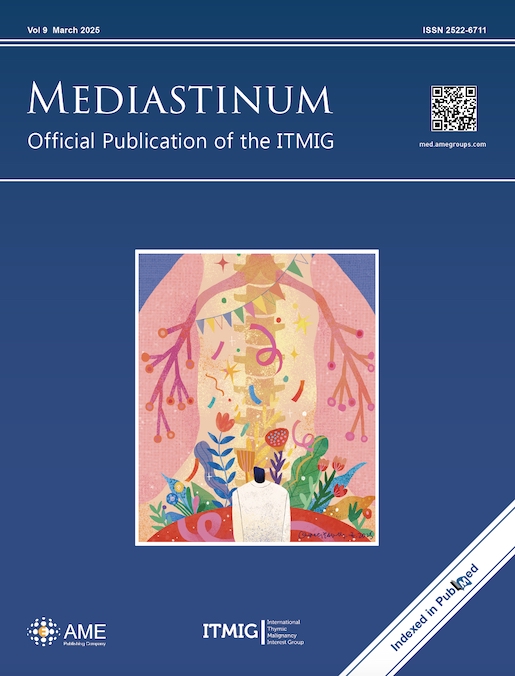ITMIG Newsletter
Volume 13
Autumn 2025
Steering Committee
Małgorzata Szołkowska
The 2024-2025 term of office will end in October this year. Dr. Małgorzata Szolkowska will step down as President, and Dr. Chul Kim will join the board as Secretary.
The new board will consist of:
- President: Dr. Dirk van Raemdonck
- Vice-President: Dr. Paolo Mendogni
- Secretary: Dr. Chul Kim
- Treasurer: Dr. Annemarie Fernandes Shepherd
- Past President: Dr. Malgorzata Szolkowska
Ms. Pam Bruce continues to serve as ITMIG Executive Director and is happy to assist with board contacts and any other matters concerning the Society.
As of August 26, 2025, ITMIG had 167 active members from around the world, representing various specialties.
Join our team and become an ITMIG member!
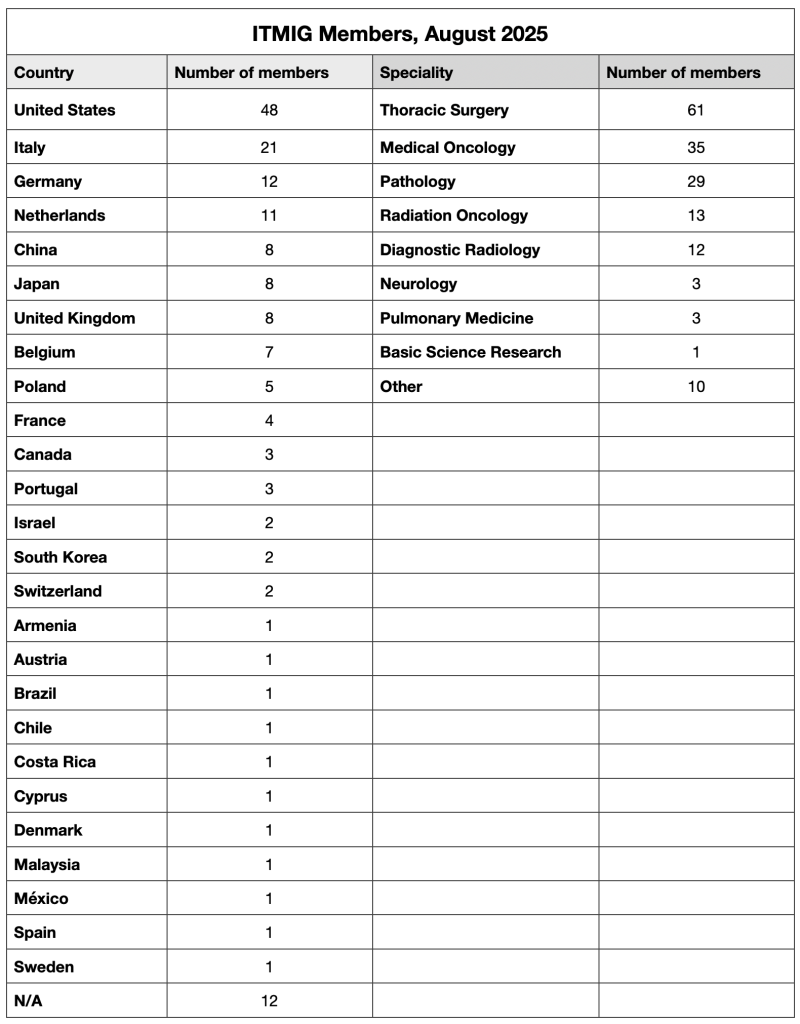
Database Committee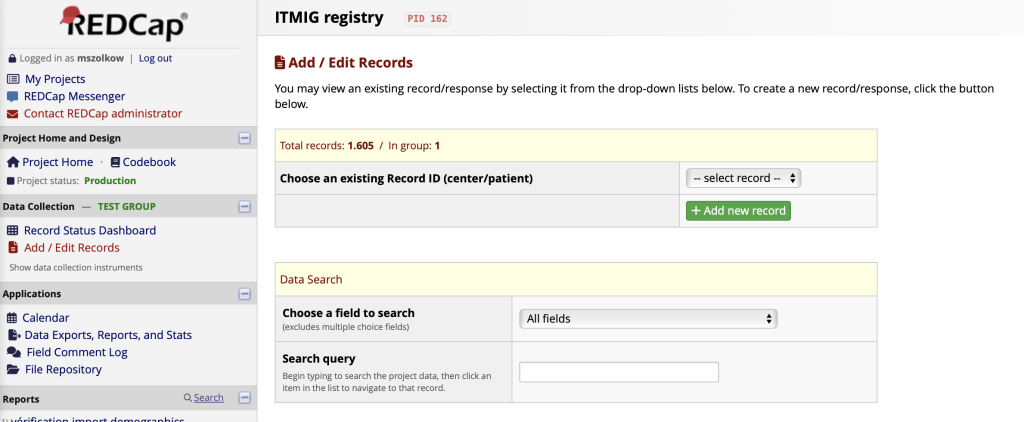
Nicolas Girard
Thanks to your efforts, the ITMIG Prospective Database has now collected over 1900 cases, and this resource is now being made available to the Membership for research.
We now have more than 10 new hospitals which joined the database as new contributors!
If you have not done so already, we are here to help you to register, activate or reactivate your site, facilitate the finalization of updated Data Transfer Agreement (DTA), and enter the data.
We also remind you about the first Request for Applications (RFA) for high quality research proposals investigating questions in the thymic tumor domain using the ITMIG Prospective Database. Any Active Member in good standing who has been a contributor to the database is eligible to submit a research proposal. We request your institute to have a DTA in place for the ITMIG Prospective Database, and to have enrolled at least 20 patients, and 5 new patients over the past 12 months. These proposals may also benefit from the data of the ITMIG retrospective database, with more prolonged follow-up. To allow your institution to complete the prerequisites for participating, the deadline for this RFA is Monday, September 1st. Applications will be reviewed and approved by the ITMIG Database Committee. The data relevant to your study will be released as a de-identified dataset for your project.
For any query or if you need assistance in registering in the database, do not hesitate to contact us (nicolas.girard2@curie.fr).
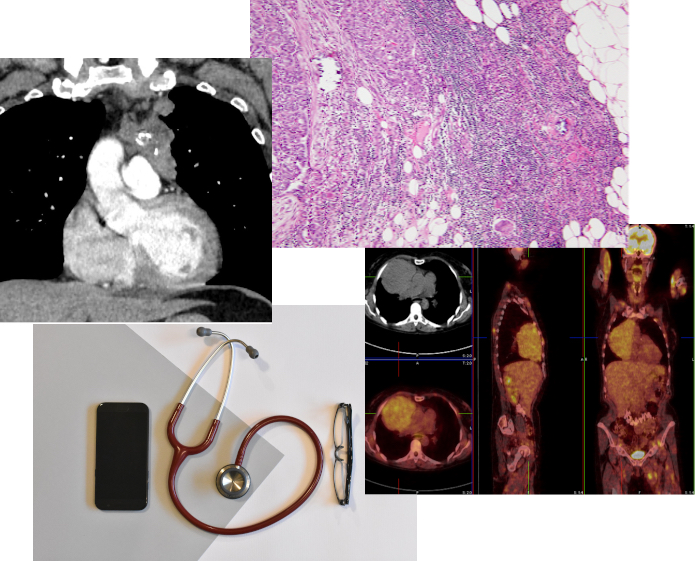 Tumor Board
Tumor Board
(https://itmig.org/virtual-tumor-board-registration-form/)
Annemarie Shepherd
From January to June 2025, the ITMIG Tumor Board convened five times, reviewing six complex and thought-provoking cases. These multidisciplinary sessions brought together leading international experts from Belgium, Poland, Italy, Israel, and the USA. Treating physicians who presented cases hailed from across the globe, including Portugal, Brazil, the United States and more, highlighting the Tumor Board’s truly global collaboration.
The discussions were highly engaging, often sparking thoughtful debate. Each case offered unique clinical challenges and learning opportunities, reinforcing the value of international expertise in managing rare thymic tumors. Among the most notable were two pediatric patients with stage IVB thymic lymphoepithelial carcinoma—extremely rare and aggressive malignancies. Other cases sought guidance on the risks and benefits of postoperative radiation, including proton therapy. We also discussed cases with unusual patterns of recurrence, emphasizing the need for tailored, innovative treatment strategies.
The ITMIG Tumor Board continues to serve as a vital platform for knowledge exchange, expert collaboration, and improved patient care worldwide. We would like to invite ITMIG physician members interested in attending these valuable discussions to email the ITMIG team (pbruce@thymic.org) to be added to the Tumor Board listserv. Please include your specialty, institution and number of years in practice since completion of training. Trainees are also welcome to join and learn from our collegial international team of experts. The schedule of the tumor board varies for each case depending on the availability of the presenting team, but is usually around 8-10 AM (Eastern Standard Time).
Education Committee
Wentao Fang
The Education Committee aims to disseminate knowledge and recent advances in management and research on thymic malignancies to our members through various platforms. In 2024, the journal of Mediastinum became ITMIG official journal, providing an additional platform for exchange of information on studies of mediastinal diseases. A message has been sent out to members to contribute art works to be used as covers for the journal. We have created a ‘Pivotal publication’ column in the ITMIG website, introducing important recent publications on thymic diseases. Also members are encouraged to send in educational materials, including surgical videos clips, to our website. The Education committee has worked out a renewed version of standard definition and outcome measures, incorporating progresses made in the past decade into the original ITMIG publication in 2010.
Right now, the committee is working on ITMIG guidelines on management of thymic tumors, starting from postoperative radiation therapy (PORT Project – see below) as a pilot project. An innovative approach using Clinically Oriented Patient Important questions instead of the traditional approach for this project is deemed appropriate for rare diseases like thymic malignancies. Anyone who is interested and is willing to contribute is welcome to join forces.
PORT Project (Proposal for ITMIG Systematic Review and Clinical Guidance Tools)
Benjamin Resio
Aim of the project: To assess the clinical value of post operative radiation therapy after resection of thymic epithelial tumors.
This project will pilot a framework for comprehensive and systematic review of existing evidence developed by Dr. Detterbeck. The framework is focused on identifying critical questions faced in clinical care; considering data limitations and effect modifiers in a structured fashion; and providing an evidence-based recommendation, organized in a way that can meaningfully influence patient management.
Method:
- Identify clinically oriented, practically important questions regarding the topic.
- Establish a priori clinically relevant differences that impact decision-making.
- Determine and classify potential confounding factors impacting outcomes and methods to mitigate their effects.
- Summarize and interpret evidence regarding clinical relevance and uncertainty, avoiding quantitative meta-analysis when residual confounding is frequent. Use structured tables and visual aids to enhance comprehension.
- Create frameworks to depict evidence and support clinical decision-making. These frameworks highlight relevant considerations, end-points, and situational modifiers to simplify decision processes.
- Design user-friendly tools for clinicians, ensure point-of-care availability, and address technological challenges. Involve focus groups and technical experts to refine the tools.
Communication Committee
Chul Kim
The primary goal of the Communications Committee is to promote ITMIG activities among members and the broader public. This is accomplished through various initiatives, including supporting the coordination of Thymic Malignancy Awareness Month (TMAM) activities and annual conferences, maintaining and updating the ITMIG website, managing the ITMIG YouTube channel (ITMIG Non-profit organization), sharing ITMIG-related updates on social media platforms (e.g., Facebook, X, Instagram), and creating annual newsletter.
In May 2025, as part of Thymic Malignancy Awareness Month (TMAM), we hosted a series of webinars covering topics such as:
- “Recent Updates from Clinical Trials and Emerging Treatment Options for TETs,”
- “Advancements in Thymic Epithelial Tumor Care” in collaboration with RHYTHMIC,
- and “Treatment of Thymic Epithelial Tumors in the Era of the 9th Edition TNM: The Current State of the Art.”
In addition, we organized webinars in Korean and in Portuguese/English discussing the diagnosis and treatment of thymic epithelial tumors. All webinars were recorded and will be made available on the ITMIG YouTube channel.
TMAM also inspired the organization of the first in person meeting with Polish patients with thymic tumors in Warsaw, Poland.
If you are interested in joining our team, we warmly welcome you. Please contact Chul Kim (Chul.Kim@gunet.georgetown.edu) or Pam Bruce (pbruce@thymic.org).
Thymic Carcinoma Working Group
Anja Roden
Our working group has been very active assembling a multidisciplinary survey on questions relevant to various subspecialties, specifically focusing on questions towards cooperation between subspecialties and on current state of management of patients with thymoma and thymic carcinoma, aspects that were not included in the survey published by ITMIG and led by Dr. Annemarie Shepard in 2017, PMID: 27876674. This survey has been shared with other Societies that have distributed it to their membership. Thank you very much to everyone who participated and answered the survey, we greatly appreciate it. We are currently analyzing the data and preparing the manuscript. Updates will be provided at our upcoming ITMIG Annual Meeting in October 2025.
In addition, we initiated a project on the pathologic and radiologic tumor response to neoadjuvant therapy in thymic carcinomas, thymomas, and thymic neuroendocrine neoplasms. Aims of the study are to assess radiologic and pathologic response to neoadjuvant therapy and to correlate response with outcome. We are still in the early stages of the project, therefore, anyone is welcome to join the project. If you are interested in joining the project please email Dr. Anja Roden (Roden.Anja@mayo.edu).
We would like to invite you to join our working group. We are looking for ITMIG members of any specialty interested in thymic carcinomas. If you have ideas for projects and/or would like to participate in the working group please contact Dr. Anja Roden (Roden.Anja@mayo.edu).
Mediastinal Working Group
Anja Roden
Our working group is studying tumors that occur in the prevascular mediastinum but are not thymoma, thymic carcinoma, or thymic neuroendocrine neoplasms.
We are currently working on a primary mediastinal germ cell tumor (PMGCT) project. Because of the paucity of PMGCT studies are in general small and information is relatively sparse. Furthermore, there is currently no agreed upon staging for PMGCT. We study the morphologic and imaging features of PMGCT and will correlate those with outcome. In addition, we will correlate demographic features and surgical treatment with outcome of patients and collect molecular data. Ultimately we would like to establish a staging system for PMGCT. At this time, data collection for pathology has been finished and data analysis has started. We are still collecting radiology contributions.
If you are interested in this working group and also if you have any ideas for other projects please contact Dr. Anja Roden (Roden.Anja@mayo.edu).
 Biology Working Group
Biology Working Group
Thierry Molina
The ITMIG Biology Working group has been launched in December 2023 aiming at gathering MD and/or PhD interested in a better understanding of the biology of these tumors and to facilitate projects either to be evaluated and/or validated at an international level thanks to the ITMIG. This group works on sample collections (blood, serum, tumor) linked to the ITMIG database and their availability through a collaborative project. The zoom call is on Thursday every month.
The first ongoing project that has been discussed by the group is TARGETTHYM-1 proposed by Nicolas Girard. There was a consensus among the participants to approve this project as a starting project for the Biology WG. TARGETTHYM-1 is the first sub-project based on the ITMIG prospective database infrastructure. Led by the Biology Working Group, the study aims at collecting data from patients with thymic malignancies who received targeted therapies – excluding antiangiogenic agents and immunotherapy- for advanced disease. We will collect molecular alterations, if any, identified at genomic profiling and correlate clinical evolution linked to type of targeted therapy, TET subtype and potential molecular alterations. The project is open: to participate, please contact nicolas.girard2@curie.fr or the database manager paulette.salamounfeghali@curie.fr to include patients in the database (more information you can find on ITMIG website: https://itmig.org/. Regulatory rules variable across the countries slow down the project. But recently new patients have been included.
Other more basic scientific projects on thymic epithelial tumors by members of the WG were presented and discussed as the autoreactome in TET by Henry Kaminski, data from single cell analysis in TET and the potential interest of BH3 profiling in these tumors by Chris Nabel, histophenotypical microenvironment in TET using Codex technology by Kirolous Hanna. We are currently discussing guidelines for optimal management of tumor and blood/serum of patients with TET for biopathology projects. We are also discussing some high level biopathology papers on the topic, potentially helping us to optimize a collaborative project within the ITMIG
If you are interested in this working group, please contact Dr Thierry Molina (Thierry.molina@aphp.fr). If you have ideas for new projects, please join us and work with us.
Artificial Intelligence Working Group 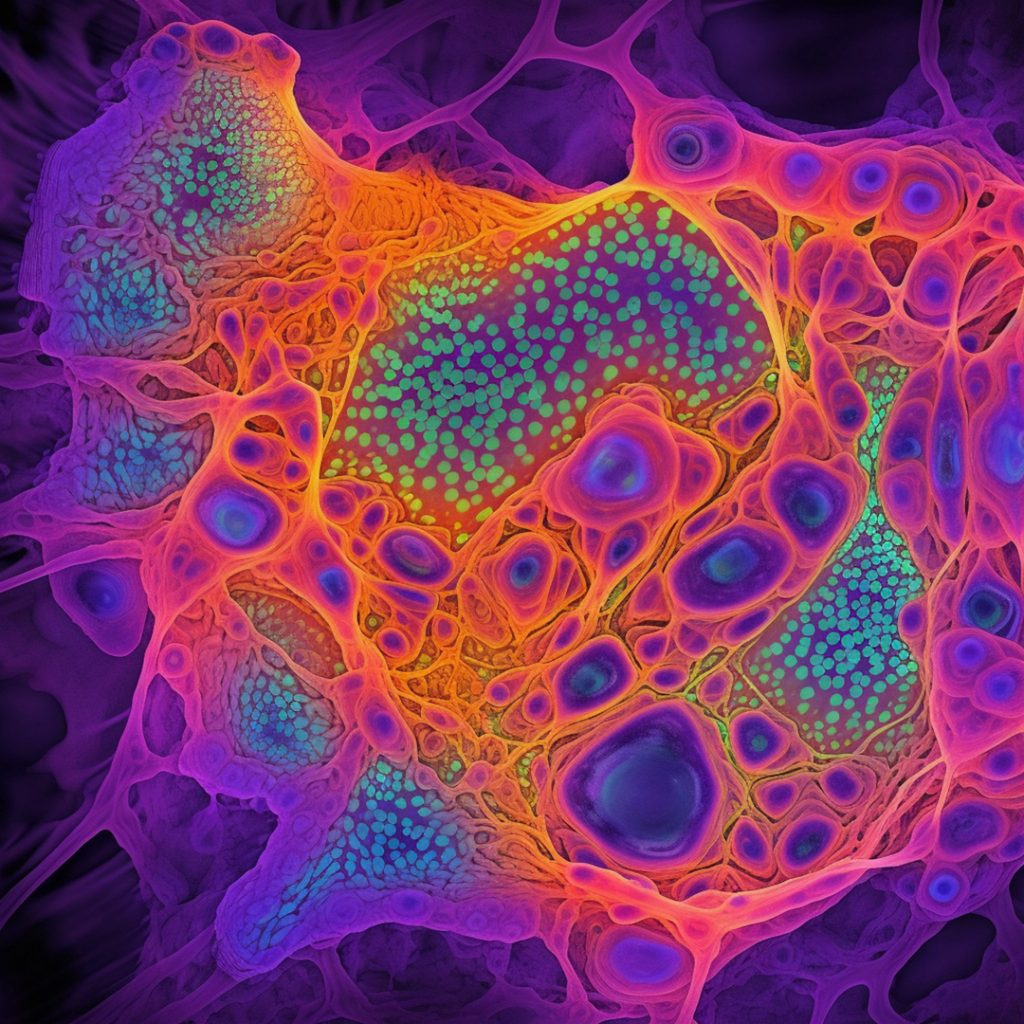
Jan von der Thüsen
The ITMIG AI working group aims to provide advice and a meeting place to those interested in setting up / supporting mediastinal AI projects in mediastinal diseases. Over the past year its members have been drafting a survey on the attitudes towards, experience of, and requirements for the use of artificial intelligence in thymic epithelial tumours (TETs). The working group is currently finalizing the draft survey, which will be shared with clinical colleagues for feedback prior to roll-out across the membership of ITMIG. As TETs are rare, and AI models are data-hungry and require external validation, collaboration between centres to increase the number of cases, especially of ultra-rare variants of TET to address class imbalance, is imperative. ITMIG offers a unique platform to facilitate this type of collaboration, and we have been carefully exploring possibilities for data transfer according to international regulatory practices. This work is currently still ongoing, but once complete, the first model to be developed will try to predict intra-class recurrence patterns of early-stage TETs. The working group has a virtual meeting every first Friday of the month, and welcomes new members, especially clinicians and radiologists!
If you have any questions or would like to enquire about joining the WG, please contact its current chair Jan von der Thüsen (j.vonderthusen@erasmusmc.nl).
SAVE-THE-DATE
ITMIG2026 Annual Meeting
with Thymic Imaging Workshop for Multidisciplinary Care
12-14 November 2026, São Paulo, Brazil
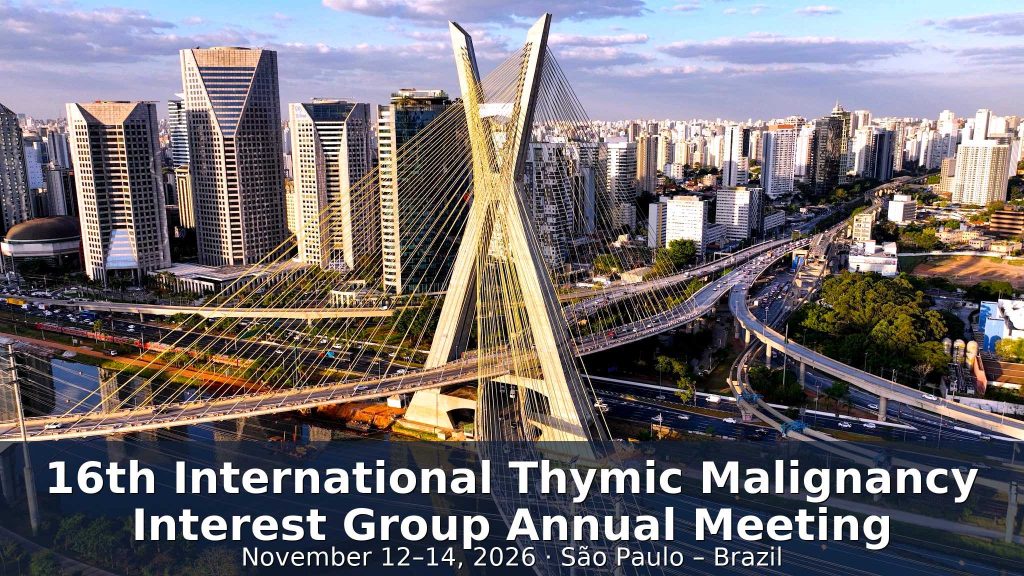
MEDIASTINUM – An Official ITMIG Journal
As of May 2024, MEDIASTINUM (https://med.amegroups.org/) serves as the official journal of ITMIG. MEDIASTINUM is an open access journal for high-quality research in mediastinum. ITMIG members who submit a manuscript through the ITMIG website are eligible to a 30% discount on article processing charge. For more information, visit the ITMIG homepage.
All abstracts from ITMIG2025 have been published in the Abstract Book on the MEDIASTINUM website (CLICK HERE) and will be available in the PubMed Central database.
ITMIG Communication Committee







